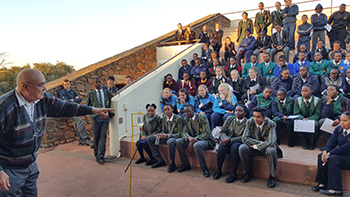Latest News Archive
Please select Category, Year, and then Month to display items
14 June 2024
|
Story Anthony Mthembu
|
Photo Suplied
 Jeremiah Hlahla, a UFS student completing his PhD in Botany at the University of Debrecen as part of an exchange initiative funded by the Erasmus+ Mobility Programme.
Jeremiah Hlahla, a UFS student completing his PhD in Botany at the University of Debrecen as part of an exchange initiative funded by the Erasmus+ Mobility Programme.
As part of an exchange initiative facilitated by the Erasmus+ Mobility Programme, Jeremiah Hlahla, a student at the University of the Free State (UFS), is nearing the completion of his PhD studies at the University of Debrecen in Hungary. Hlahla’s journey, which began in February 2024 and is set to conclude in July 2024, has been a remarkable learning opportunity. “As a first time-traveller to Europe, I have thoroughly enjoyed engaging with people from different countries and cultures,” he said.
The benefits of international collaboration
Hlahla is currently pursuing a PhD in Botany, focusing on plant stress physiology. “My current PhD project investigates the physiological, biochemical and morphological responses of vegetable-type soybean, or edamame, to combined drought and heat stress,’’ he explained. He considers the University of Debrecen the ideal institution to complete his research due to its extensive expertise and resources in similar projects. He noted that his colleagues at Debrecen conduct significant work on plant protection against biotic and abiotic stresses, including salt and drought stress, as well as proteins and amino acids in barley and other legumes.
Given the vast knowledge available on similar projects, Hlahla has found substantial engagement with his work at the University of Debrecen. “Upon arrival, I delivered an introductory lecture presenting my UFS project on the synergistic effects of combined drought and heat stress on the physiology and biochemistry of edamame. It was an engaging session as everyone could relate to my work and asked many questions,’’ he said.
Insights gained from the exchange
Hlahla has also gained valuable lessons that will assist him in his research career, including biotechnology and physiology tools. “I learned how to prepare samples and use high-performance liquid chromatography (HPLC) and reversed-phase ultra-high-performance liquid chromatography (UHPLC) to quantify proteins and amino acids,’’ he said. These techniques are beneficial not only for his current work but will also support future soybean research.
As his experience at the University of Debrecen nears its end, Hlahla reflects on the collaborations and friendships he has formed, which stand out as a significant highlight.
Science-for-the-Future host learners at Boyden Observatory
2017-06-15

Prof Jan Smit from the North-West University captivated
the learners with his presentation.
Photo: Supplied
In order to advance innovative Mathematics and Science teaching and learning, Science-for-the-Future from the University of the Free State’s (UFS) Faculty of Education hosted close to 100 Grade 10 Mathematics and Science achievers from 18 local secondary schools at the Boyden Observatory in Bloemfontein on 7 June 2017.
According to Dr Cobus van Breda, the Programme Director of Science-for-the-Future, the purpose of such events is also “to encourage learners to enter into science-related studies and careers, including the teaching profession, since we are in desperate need of good Maths and Science teachers in South Africa”.
The evening included contributions by two visiting National Science and Technology Forum (NSTF) award-winning presenters.
Prof Peter Dunsby from the Cosmology and Gravity Centre at the University of Cape Town gave the audience much to think about with his presentation titled ‘From the Big Bang to the Big Rip. Should we be afraid of the Dark Side of the Universe?’
Prof Jan Smit from the North-West University, on the other hand, explained basic Physics concepts using mostly household items. Mariette Erwee and Prof Matie Hoffman from the UFS concluded the evening with stargazing through the telescopes, as well as an open-air session on constellations.